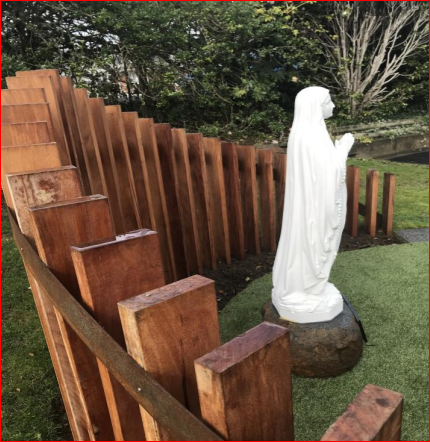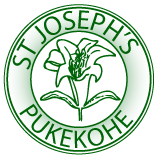
Special Character & Religious Education at St Joseph’s
“First and foremost every Catholic educational institution is a place to encounter the living God who in Jesus Christ reveals his transforming love and truth.” Pope Benedict XVI
As a Catholic school we are called to participate fully in the Church’s mission by forming Christ in the lives of others, therefore evangelising through an ongoing genuine encounter with Christ. This ongoing encounter with Christ is facilitated through proclaiming the Word of God, teaching our Religious Education programme, Classroom Prayer, Masses, Liturgies, pastoral care of all in our community and charity work.
“As an ecclesial entity the Catholic school reflects the nature of the Church. It proclaims the word of God in its programmes and activities; it celebrates the Sacraments and assists parents and parishes in preparing the members of its community for their reception; in its embrace of those students who are disadvantaged, it exercises the ministry of charity, as well as in the charitable works that the school community might undertake.” Education of Catholic School Age Children, Paragraph 7
Students at St Joseph’s School are provided with a quality learning programme reflecting our Mission Statement: “Excellent Education befitting our Catholic Character”. Our school vision, values and principles are built on our founders’ RNDM Mission Charism and reflect Gospel and Catholic social teachings through educational, Church and social, cultural, bi cultural and multicultural perspectives. These perspectives permeate all learning areas.
Catholic Schools have the obligation to provide education with a Catholic Character in all dimensions of their school life, each essential learning area is taught from a Catholic perspective. (RECS 1996 p8)
The expected learning in Religious Education, for Years 1-8, is spread through six Learning Strands and four Learning Modules, forming the basis of an integrated curriculum school wide concept for each term. These are set to change in 2023 when the New Religious Education Curriculum will be implemented.
The current Learning Strands are:
-
God – The Father Almighty / Te Atua – Io Matua Kore
-
Jesus Christ – His only Son Our Lord / Hehu Karaiti
-
The Holy Spirit – The Lord, the giver of Life / Te Wairua Tapu
-
Church – Community of Disciples / Te Whanau a te Karaiti
-
Sacrament / Hararameta
-
Communion of Saints / Te Kotahitanga o Te Hunga Tapu
The Learning Modules are:
-
Liturgical Year / Te Tau me ona ritenga tapu
-
Prayer / Te Karakia
-
Myself and Others / Ko au, Ko ratou
-
Sacrament Celebrations / Nga ritenga Hakarameta
The modules are essential learning material and are used at appropriate times during the year.
Cross Strand Themes are interwoven throughout the Learning Strands, and they include Scripture/Tradition, Prayer/Liturgy, Doctrine and Christian Living. (see RECS 1999 pp17&18 for notes and diagram)
Achievement Objectives are identified from the RE Bridging Doc, and from these Learning Outcomes for each lesson are identified. Faith is deepened through the development of knowledge, skills, attitudes and values. Faith develops and shapes the student, and their response is revealed through their feelings and actions (the affective domain), however teachers should never presume to assess faith.


